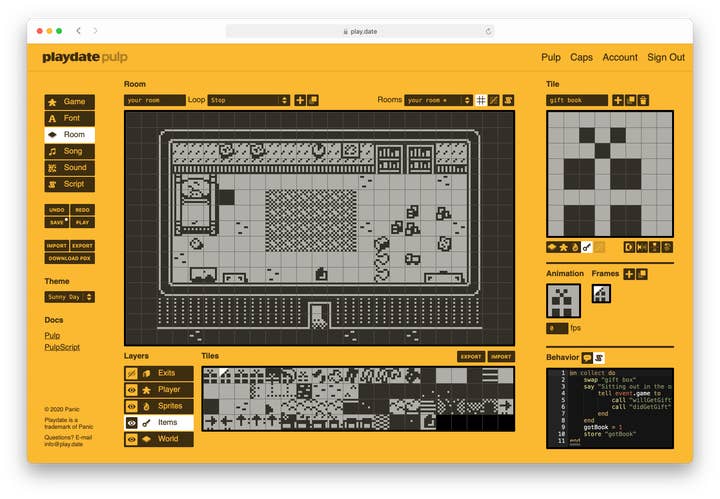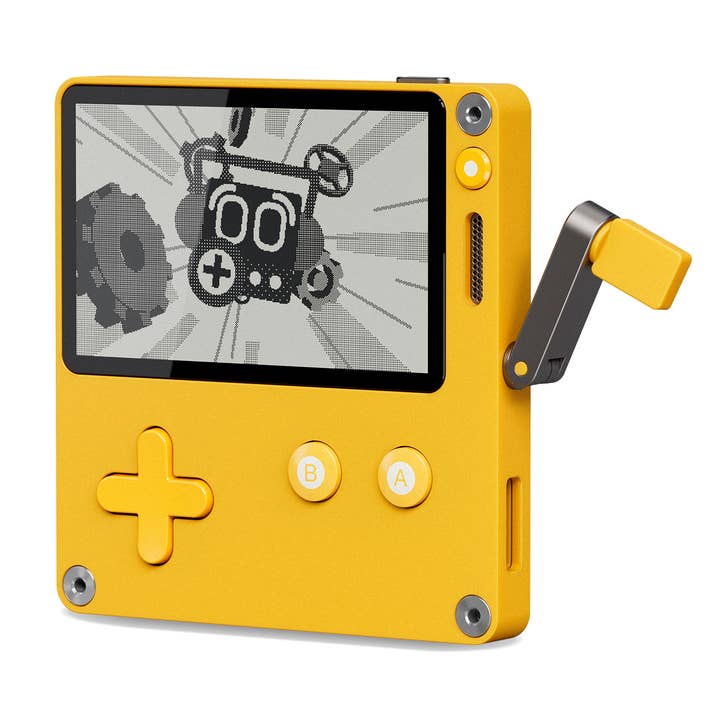"We never really thought anyone was going to make a Playdate game"
We talk to Panic about finally getting its "ducks in a row," getting more awareness and retail opportunities, and what the future holds for its "weird bizarre device"
It's now been two years since the hotly anticipated launch of Panic's handheld, the Playdate.
70,000 units had been sold as of February 2024, and Panic revealed a few more stats about its cranky yellow console last week, to celebrate its anniversary.
150,000 games have been sold since the March 2023 launch of the Playdate storefront, Catalog, representing $544,290 in revenue for the developers behind them. Panic's shop featured 181 games as of April 3, 2024, plus over 800 titles available to sideload via itch.io and the likes.
And that, in itself, is a huge victory for the Panic team.
"We never really thought anyone was going to make a Playdate game," Greg Maletic, Panic's head of special projects and Playdate, tells us when we meet at the Game Developers Conference last month. He says that's the reason why Panic planned Season One, 24 titles that progressively release on players' consoles upon registration.
"We just didn't want to put it out there and say 'Gosh, we can't wait to see what you do with that!'... there was gonna be fun that you got from the device when it arrived in your mailbox, and that was the season idea. But we never imagined there'd be a thousand games out for it in this span of time."
He continues: "If for some weird reason we had to render a verdict right now, 'What happened with Playdate', I think we would say it was a success. It was a success beyond what we imagined."
"Now we have our ducks in a row, the goal is to push the platform... There's a lot of people who still don't know about Playdate"Greg Maletic, Panic
On the creators' side, head of Playdate developer relations Arisa Sudangnoi adds that the success feels unmitigated, especially since the launch of Pulp, Playdate's very own in-browser game making tool, which doesn't require any previous programming experience.
"The fact that so many people have mentioned to us that it's their first time making a game and it just brings them so much joy that they were able to make their dream come true… that in itself is a success," she says.
That's not to say the journey has been smooth sailing. COVID-19, parts availability, defective batteries right before shipping, swapping the CPU one year out, starting over three times to make the stereo dock (still not out, "it was supposed to be the easy side project," Maletic laughs)...
Sudangnoi mentions how much of a learning experience making and shipping hardware has been for the whole Panic team, and how aware they are of the mistakes they made along the way. It's worth mentioning that the company only has 25 staff.
"We've made it through all that," Maletic continues. "As soon as we get everything in line, something goes haywire. Recently, our shipping company in the US was acquired and they decided to drop all their smaller customers, us being one of the smaller customers. So we had to find a new one, which we have done now.
"Our factory in Malaysia was acquired by a larger company and we needed to find a new factory... So that's the process right now. And so it never ends. I'm such an idiot, I'm thinking 'Maybe it's done now, maybe it's gonna be all easy from here on out'... It's never ending, unfortunately," he smiles.
Maletic does highlight that all the core elements are there and thriving though: a product that works, an online game store, and a "vibrant" developer community.
"Now that we think we have our ducks in a row, the goal is to push the platform, push this out to people" he says. "There's a lot of people who still don't know about Playdate, who've not heard about it. And so the goal is to try and increase that penetration and awareness of the product. We know from the surveys we do that the people really have a good time with it. They really like it. And we just think if we can get more awareness then we can get more Playdates out there, which makes more money for our developers. And so that's what we're shooting for right now."
"So many people have mentioned to us that it's their first time making a game and it just brings them so much joy… that in itself is a success"Arisa Sudangnoi, Panic

As part of its efforts to bring the Playdate to more people, Panic sold the handheld at retail for the very first time at GDC, in the event's official shop. All of the 160 Playdates available for sale were shifted. Maletic says that played out way better than Panic anticipated.
"This was very encouraging," he continues. "This is really the first time we tried that and we want to do it more, the challenge is figuring out what the right avenues will be. For example, Target might be cool [but] I don't know if we can do something like that volume or whether our product, [buyers] get it at home, and go 'Wait, it's black-and-white?!' We don't want people confused about it. So I don't know what the right thing will be.
"There are boutique stores that would fit in nicely, [but] is the volume enough to make that worth the effort? And so we have to figure out the balance of what are the venues that mesh with the vibe of Playdate, but also will do enough volume to make it worth the effort. So we don't know. But we're going to try and figure that out."
The Panic team is hoping to look more closely at the community's evolution and the console's retention as well.
"It's something we actually need to measure better because we do wonder that in-house. We've just now got to the point where we have enough things in place, [and] we can start thinking about these second order things; who's playing with it still, who's put it in a drawer and hasn't gotten out in a while?"
.png?width=720&quality=70&format=jpg&auto=webp)
He continues: "But there are a considerable number of people who are still using it and we're still shipping them very aggressively. There's a lot of people who just got their Playdate today for the first time, and so it's brand new [to them]."
The games are obviously key to not only retaining existing players, but also attracting new ones. The storefront's launch last year and things like the recent release of Lucas Pope's Playdate game, Mars After Midnight, are attempts to get people interested in the console again or for the first time, Maletic says.
Sudangnoi adds that she's constantly impressed by the new things Playdate developers come up with, adding that the platform maturing just naturally leads to creators being more advanced in how they tackle making games for it. She tells us a bit more about Panic's approach to curating Catalog and selecting titles for it.
"[You] don't have to buy stuff from us, you can go on itch.io or you can have your own website and sell [your game], but we wanted to have a store that's curated by us, games that we think people would enjoy," she says. "So even if we're not into racing games or whatever, [if] we see a game [that's] polished, it's something that people would enjoy. So I think that's part of [the selection process].
"Things like direct ports [or clones], like we see a lot of Pong games... Those are probably the ones we wouldn't have on the Playdate, unless they do something totally different that is specifically for the Playdate. And part of it is because our resources are so limited and so we have to be mindful... Especially if someone wants to release their game for free, there's only so many of those we can do."
.png?width=720&quality=70&format=jpg&auto=webp)
Maletic adds that it doesn't mean these games will automatically be discarded for Catalog, but that the team just naturally gravitates towards things that are a little more unusual, or presenting a new take on a known concept.
"One of the nice things about our platform being open is, if we end up, unfortunately, saying no to somebody, they still have an outlet to get the game out via itch or some other avenue," he adds.
The handheld market has really boomed in the past few years; from the Steam Deck emerged a wealth of similar PC-focused portable hardware, not even mentioning the ever-evolving market for retro-inspired consoles.
"I feel like the Playdate is so unique compared to the other stuff that's out there: Switch, Steam Deck and stuff," Sudangnoi says. "People are buying Playdates for a different reason and a lot of people have that nostalgia of just something simplistic, right?
"It's black-and-white and it's so small. And I think the other aspect is that because we have this crank that's very different... Controllers and all those things have been the same for a while. Just d-pad, joysticks. And so having a crank I think really... If someone wants a little addition to gameplay, that brings a little oomph.

"And the addition of being small and so portable, right? I heard a lot of people say, 'Oh, I can just bring it around with me everywhere'. Parents who don't have time, they can just play it real quick, play with their kids. I had someone mention that they had a concussion and can't look at screens. And because we don't have a backlight, that was the only thing they could do."
Maletic says that there are a lot of amazing handhelds out there, in particular the Analogue Pocket. But he agrees with Sudangnoi that the Playdate is fairly unique in this space.
"We don't focus on competition that much, not because they aren't worth focusing on, there's lots of good stuff, but we're sort of on our own mission and we try not to get too distracted.
"Playdate is about new games, it's not about replaying old games. Playdate is in a way a kind of retro device with [a] black-and-white screen and so on, but the game mentality feels very modern to me in a lot of cases. They feel like games made in 2024. They just happen to run in this weird, bizarre device. And so I appreciate Playdate as being a new platform for new ideas."
Sign up for the GI Daily here to get the biggest news straight to your inbox

